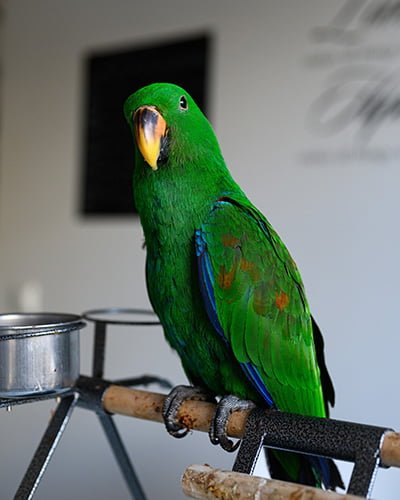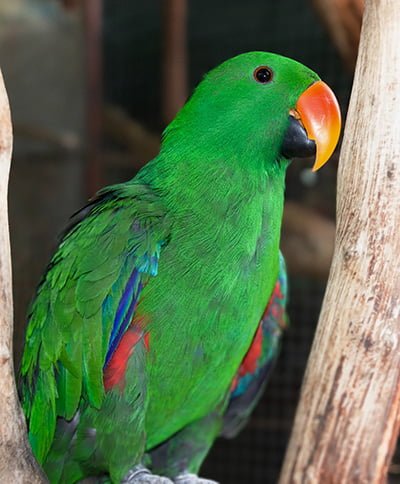Welcome to the world of the Eclectus Parrot - a bird with a personality as vibrant as its feathers! Known for its strikingly bright plumage, the Eclectus Parrot is a sight to behold. But don't let its beauty fool you - this parrot is not just a pretty face. Intelligent, curious, and endlessly entertaining, the Eclectus Parrot is a beloved companion for bird lovers worldwide. Whether you're a seasoned bird owner or simply curious about these captivating creatures, the Eclectus Parrot will leave a lasting impression. So let's dive into the world of this colorful avian and discover what makes the Eclectus Parrot so special.
Whether you choose a bright green male Eclectus or a red and purple female Eclectus, these generally calm birds make intelligent and social companions. So let's dive into the world of this colorful avian and discover what makes the Eclectus Parrot so special and what you need to know to help these birds thrive when kept as a pet.
About Eclectus Parrots
The Eclectus parrot (Eclectus roratus) is a parrot species native to the Solomon Islands, New Guinea, northeastern Australia, and the Maluku Islands. While the parrot populations on some of these relatively small islands are low, Eclectus parrots are considered to be a pest in other areas. The Solomon Island Eclectus parrot, for example, is a considerable nuisance to fruit farmers! Their native habitat is in woodlands near water and other coastal areas - such as mangroves and freshwater swamps.
Eclectus parrots are unique compared to other parrot species because of their extreme sexual dimorphism. In fact, the first ornithologists of these Eclectus parrots thought they were observing two distinct species! There are nine subspecies, distinguishable by size and small differences in coloring.
Life Expectancy
This parrot family has an average life expectancy of between 30 and 50 years! Your companion bird will be with you for a considerable time, which should be considered when choosing a parrot as a pet.
Behavior & Temperament
The Eclectus parrots have a shy, gentle temperament. If ever a parrot could be described as "cuddly," the Eclectus parrot is it!
They are also very affectionate and social birds! In their natural habitat, they live in pairs or small flocks and always roost in small groups for the night. As social birds, they are also very communicative and can be noisy! It's fun to train this parrot species to speak phrases, and they do tend to "chatter" less than other parrots.
A pet Eclectus will need socialization each day. Interacting with their family is the most crucial part of their day. They are sensitive and will become stressed if they are neglected. Your Eclectus parrot will learn your family's routines and may feel anxious if this routine is disrupted.
Eclectus parrots are calm birds, and both male and female parrots make great pets. However, there is a difference in temperament between the sexes. The males are more trainable and agreeable, in general. The female Eclectus parrots can be bossier. They may still lay eggs, although they won't be fertilized or viable, and this means that she will have strong nesting instincts. However, the females are also less dependent on their owners and don't seem to be as bothered by less frequent socialization.
Gender Identification
Eclectus parrots are unique compared to other parrot species because of their extreme sexual dimorphism. While the males and females of any bird species look different from each other, typically, the difference is that the male is brightly colored while the female's plumage is more subdued. In the sexually dimorphic Eclectus parrot species, however, both males and females are brightly colored and look vastly different.
So, how can you tell if your Eclectus Parrot is a boy or a girl? The male Eclectus parrot has bright emerald green plumage with small splashes of blue and red beneath the wings. The female parrot, however, has a bright red body with violet on the breast and under the wings and orange central tail feathers. The male birds' brilliant emerald green plumage helps them blend in among the trees. The red color of the female is easily seen if she sits at the entrance to her nest hole, attracting males. However, when it's time to roost over her eggs, the deep red and purple colors hide her within her nest.
Another way to tell the difference is by observing their behavior. Male Eclectus Parrots tend to be more vocal and outgoing, while females are often quieter and more reserved. Additionally, female Eclectus Parrots are typically more independent and can be somewhat standoffish, while males are more affectionate and enjoy socializing with their owners.
The most foolproof way to determine your Eclectus Parrots gender is by DNA testing. This involves a simple blood test that a veterinarian or avian specialist can do. While it may seem like an extreme measure, DNA testing can provide accurate and definitive results, which can be especially important if you're planning to breed your bird.

Housing
The Eclectus parrot is among the largest of all the parrot species, with adults growing between 17 and 2o inches long. They need a cage large enough to handle their size, and they thrive as aviary birds. If you lack the room for an aviary, be sure to get a cage that is at least 2 feet long, 3 feet wide, and f feet tall.
These large species need lots of exercise. Let your pet parrot out for at least two hours a day in a bird-safe area of your house.
A variety of perches should be placed throughout their cage. If only one type of perch is used, their feet will lose strength and dexterity. Eclectus parrots also need ample climbing challenges, such as ladders and swings.
Heat & Humidity
The temperature of most households is sufficient for pet Eclectus parrots. Aim for a temperature range between 65 and 75 degrees Fahrenheit. Run a mister in the cage regularly. This will both boost the humidity in your pet parrot's habitat and help your bird keep clean.
Light
To avoid stress, make sure that your household light patterns mimic those of the natural world. The Eclectus parrot is prone to stress if their daily routine is disrupted. Keep lights on or blinds open during the day, and avoid too many artificial lights at night.
Feeding
Eclectus parrots are herbivores - and, more specifically, frugivores. Their diet consists almost entirely of fruits, with some unripe nuts, flower buds, and seeds. Wild figs, papaya, and pomegranates make up the bulk of their diet in the wild. Compared to other species, this parrot family requires a diet higher in fiber and lower in fat.
When kept as a pet, feeding them plenty of fresh fruits and vegetables is important. A full 80% of their diet should be fruits and vegetables. Seeds and nuts should only be an occasional treat, and it's best if they've been sprouted first. Their daily carbohydrates should come from parrot pellets or cooked pasta.
Avoid any vitamin or mineral supplements, as they can lead to digestive tumors in this type of parrot.
Water
It's important to provide plenty of fresh water for your parrot, and water bottles should be provided for drinking. Some parrots have a hard time figuring out how these work, but Eclectus parrots are highly intelligent and don't tend to have an issue. An open water dish should also be provided, for bathing and misting.
Substrate
Parrots won't spend too much time on the bottom of their cage, but it's critical that this part of their habitat be clean and made from a good material! Paper is the best substrate for parrot cages and aviaries, and any type of paper is fine. It is cost-efficient and has the added benefit of lying flat on the bottom of the cage, making it easy to monitor your Eclectus parrot's droppings.
Wood chips and wood shavings should never be used. The scent of many wood shavings can cause health problems in parrots, and having to sift through the shavings to clean and monitor your bird is an unnecessary hassle. For similar reasons, crushed walnuts, corn cob pellets, and pulp beddings should be avoided.

Common Health & Behavior Problems
As any pet owner knows, ensuring the health and well-being of your furry (or feathered!) Friends are of utmost importance. And when it comes to the Eclectus Parrot, owners should be aware of a few common health issues and behavior problems.
Obesity
Eclectus Parrots tend to overeat and can quickly become overweight if their diet is not carefully monitored. To combat this, it's important to provide your parrot with a balanced diet that includes plenty of fresh fruits and vegetables and a high-quality pellet or seed mix.
Feather Cysts
Another health concern for Eclectus Parrots is the development of feather cysts. These small, fluid-filled sacs form under the skin and can be caused by various factors, including poor diet, hormonal imbalances, and stress. If left untreated, feather cysts can become infected and cause discomfort for your bird. Thankfully, they can usually be treated with a combination of diet changes, hormone therapy, and surgical removal if necessary.
Respiratory issues
Respiratory issues are another common health problem for Eclectus Parrots. Various factors, including poor air quality, exposure to smoke or other pollutants, and bacterial or fungal infections, can cause these. Signs of respiratory distress in your parrot can include wheezing, coughing, and difficulty breathing. If you notice any of these symptoms, it's important to seek veterinary care right away.
Viral and Bacterial Infections
Like all birds, Eclectus Parrots are susceptible to a range of viral and bacterial infections. This is why it's important to maintain good hygiene practices, such as regularly cleaning your bird's cage and providing fresh, clean water. If you notice any changes in your bird's behavior or health, it's always best to err on the side of caution and consult with a veterinarian.
Stress
The Eclectus parrot is sensitive to stress and exhibits this through toe tapping, feather plucking, and wing flapping. Many things can stress out your Eclectus parrots, such as a change in routine, a lack of socialization, loud noises in their environment, and jealousy of other pet birds. For this reason, they are not the best pet option for families with dogs or children.
Nutritional Deficiency
Eclectus parrots have a different diet than many other bird species. It's common for pet Eclectus parrots to be deficient in vitamin A and fiber. If possible, rectify this through your choice of vegetables and not through a supplement.
